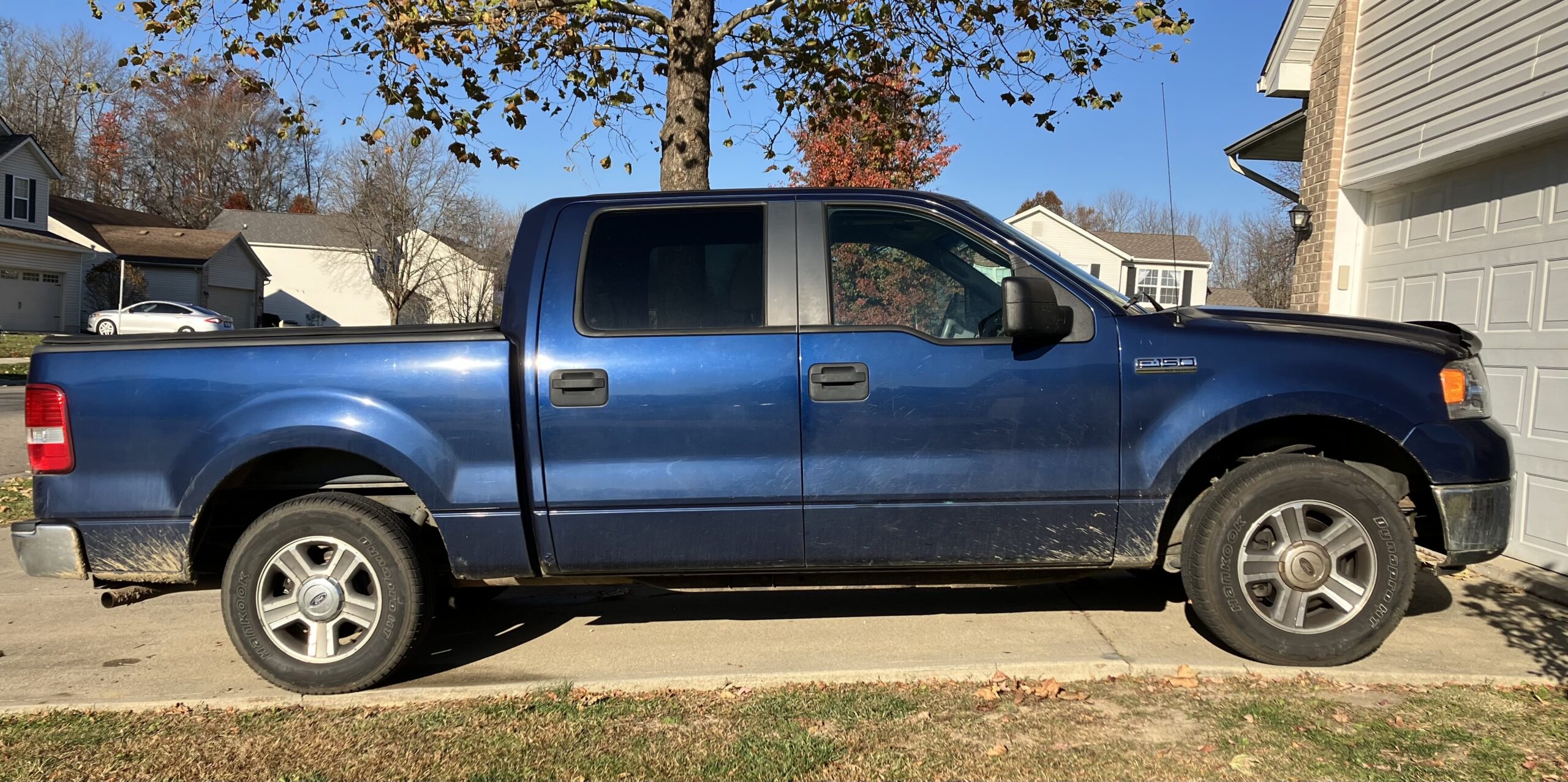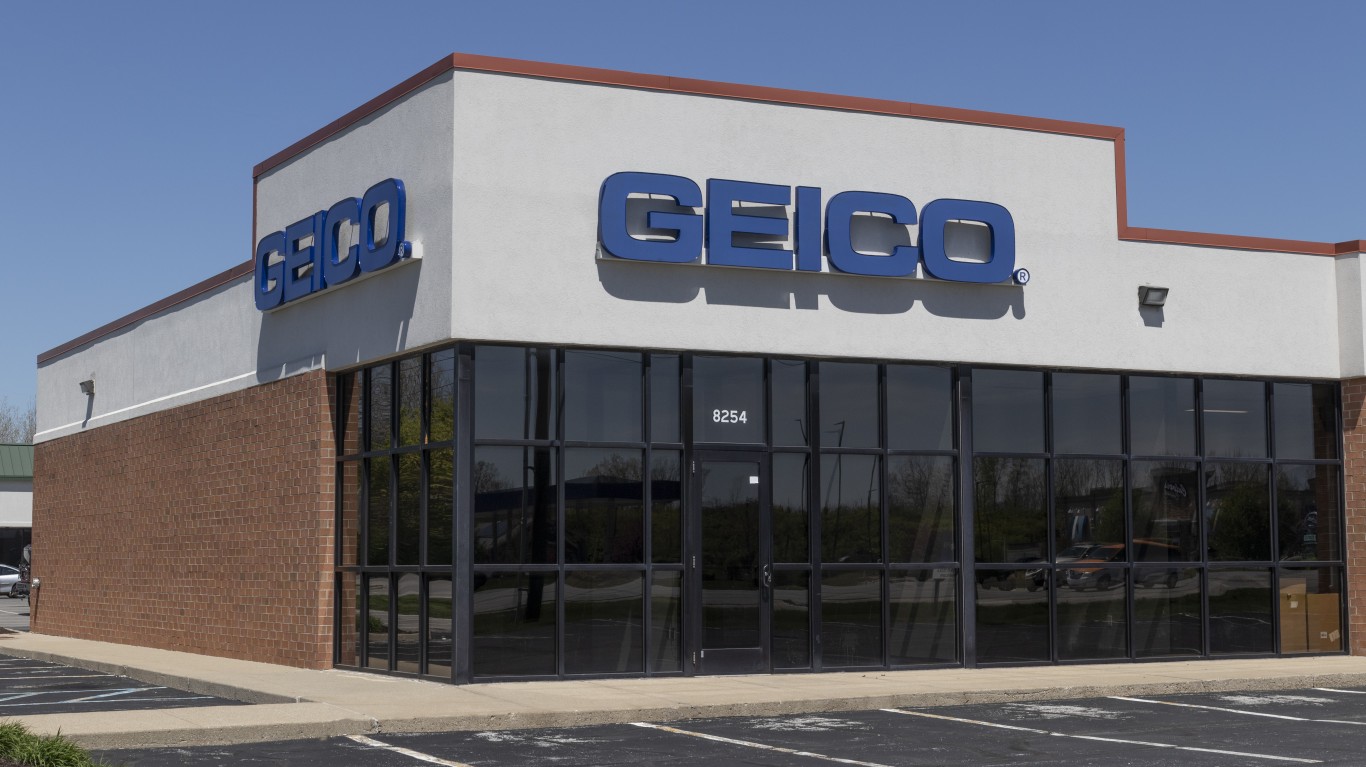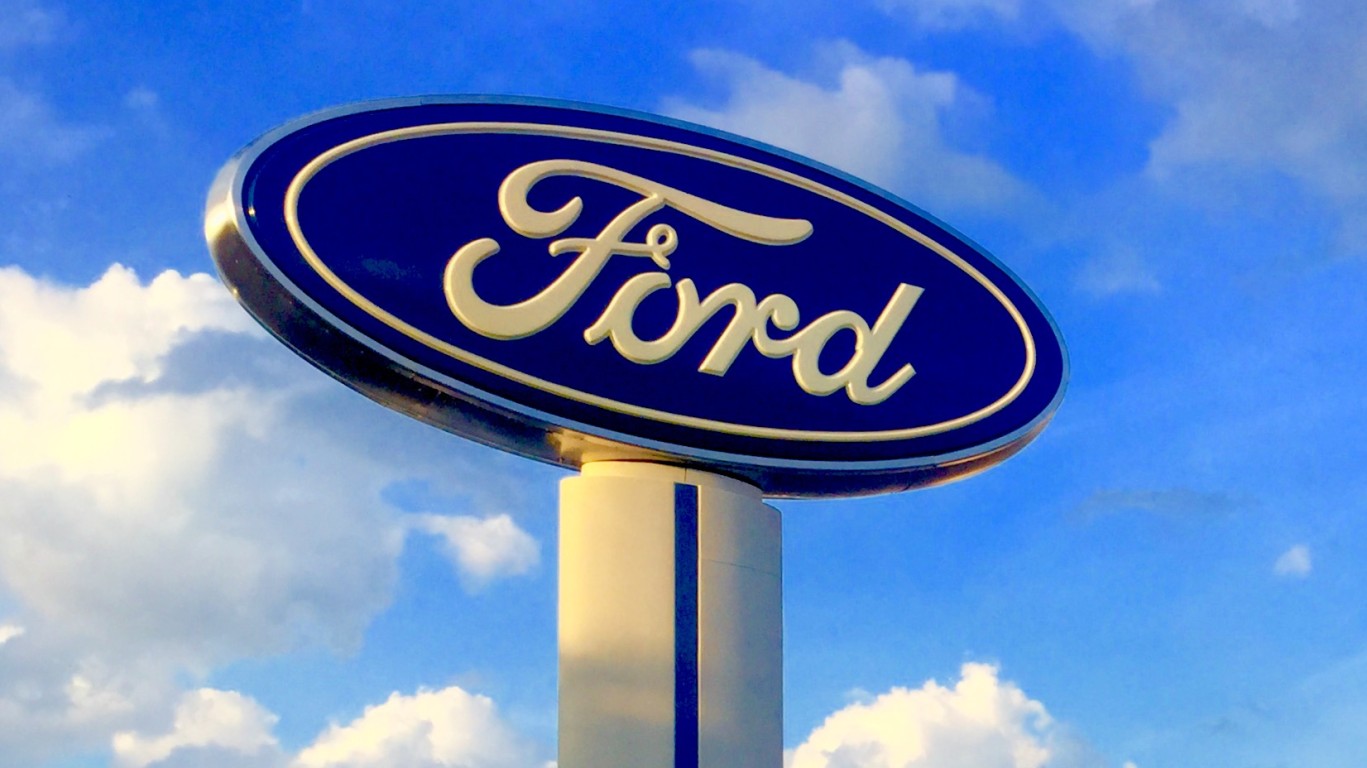
Ford has some sweet new vehicles for 2024. The company has stopped manufacturing cars, except for the iconic Mustang. It is now focused on trucks, SUVs, and EVs, and its new arrivals are awesome. Personally, I would take the new Raptor over just about any vehicle on the market today. However, here in the real world I still drive a 2007 Ford F-150. I understand if you need to pause for a moment to allow your feelings of intense jealousy to subside. I’ll wait. (If you’re unlike me and are completely over your old truck, here are the most fuel-efficient new pickup trucks on the market. Three of the top five are Fords.)
This is my F150 in all its 2007 glory. My 16-year-old Ford truck doesn’t have an infotainment system. It has an AM/FM radio with a CD player.
The truck doesn’t have dual climate control. It has one climate that all passengers must accept because, well, there’s only one control.
There is no tire pressure monitoring system. I have to use an old-fashioned tire gauge to ensure the tires are properly inflated.
I could go on and on about the modern features and conveniences that my truck lacks. And yet, I have no plans to give up this old truck anytime soon (unless someone wants to buy me a Raptor, in which case I might reconsider). On the contrary, I plan to drive this old Ford until the wheels fall off. Here’s why.
Reliability
One reason I choose to keep driving my old Ford truck is because it has been almost shockingly reliable. It has hauled our family of four throughout eastern Canada with a camper in tow. We also towed a camper from our Cincinnati home to Yellowstone and back. The truck handled these, and many other long trips over the years, with zero issues. Whether it’s a cross-country trip or a crosstown run to the grocery store, the truck has never failed me. Ever.
To be fair, Ford has not always been known for its reliability. Anyone old enough to remember the Pinto can vouch for that. The fuel tank would rupture and the car would literally explode into flames if it was rear-ended. Just a minor design flaw, right?
The company has been plagued with recalls over the years, and the issue persists as Ford led all auto manufacturers with 67 separate recalls in 2022. My wife’s Escape needed an engine replacement this year under a Ford recall. The repair took about a week, so I completely understand how frustrating and inconvenient these recalls can be.
Chances of Reaching 250,000 Miles
However (you knew that was coming, right?), a recent survey by iSeeCars noted that a Ford F-150 has a 19.7% chance of lasting 250,000+ miles. The F-250 Super Duty has a 43.6% of lasting that long, while the F-350 Super Duty has a 49.1% chance of lasting over 250,000 miles. That was the best rating of any truck in the survey. There’s a reason the Ford F-Series has been the best-selling truck in the U.S. for 46 years and the best-selling vehicle overall for 41 years. Drivers know that Ford trucks are super reliable. They just seem to keep right on rolling, and I’m content to let mine do just that. (Here’s a look at America’s favorite pickup trucks.)
Value

According to Kelley Blue Book (KBB), my F-150’s trade-in value is around $6,500. If I decided to sell it privately, I would fare slightly better. A “For Sale” sign in my truck’s window could fetch as much as $9,100.
The 2024 F-150 model most equivalent to my current SuperCrew XLT has a base price of over $47,500. Even if I received top dollar for my current truck (which is doubtful) and then bought the most stripped-down 2024 model available, I’m still looking at a difference of more than $38,000. This is why my old Ford truck is worth far more to me than it would be to anyone else. KBB says it is worth, at most, $9,100. To me, it’s worth over $38,000 since that is what it would cost me to replace it.
Worthwhile Repairs
But what about repair costs? Yes, a 16-year-old vehicle is going to require a visit to the shop now and then. And yes, it can be pricey. A couple of months ago, I replaced the brakes, ball joints, control arms, fuel pump module, and a few other components. The total repair bill was over $3,500. That’s certainly not cheap, but it was far less expensive than purchasing a new (or even a used) truck. I would have to pay that same repair bill ten more times to equal the cost of purchasing a new truck.
You may not agree with my reasoning, and that’s fine. There has even been disagreement within my own family. My grandfather, for example, would never drive a car for more than 100,000 miles. When the odometer approached six digits, he went car shopping. However, my brother drove his Ford Expedition for over 330,000 miles. I don’t know if my truck will keep rolling for 300,000+ miles, but I’m going to give it a go.
Additional Savings

Along with the truck’s actual (and personal) value, there are additional savings that I enjoy by driving my old Ford. For example, it doesn’t cost much to insure the truck. Insurance costs vary widely based on driving record, age, location, etc. I live in Ohio, am in my mid-40s, and have no accidents or tickets on my record. Insuring this old truck with full coverage costs me less than $70 per month. I may switch the coverage to liability as the truck ages, which would cost even less. Full coverage on a new 2024 F-150 would probably add about $100 to my monthly bill.
I also save on smaller, incidental costs that new vehicle owners often incur. Take car washes as an example. When I owned new vehicles, I singlehandedly kept the local car wash in business. My new car needed to look like a new car, which meant washing it every week. Sometimes multiple times a week. I would also purchase Turtle Wax and Armor All to really give it a shine, inside and out.
Fast-forward to today…I can’t even remember the last time I washed my truck. (Refer back to the picture at the top if you need proof.) I’ll vacuum it out from time to time, but that’s as far as it goes. The truck gets dirty because it’s a truck and I use it as such, but I never wash it. Instead, I just wait for it to rain. That’s as much of a wash as my truck ever receives. My apologies to the owner of the neighborhood car wash.
Familiarity

When you’ve driven a vehicle as long as I have driven my old Ford, you know what to expect. It has a proven track record. It is an honest experience of sorts.
The “vroom” of a new car is certainly enticing. Couple that with the pristine look and the new car smell that we all love and it’s understandable why anyone would want to get in on that.
However, when you look beyond the shiny bells and whistles, that new car is an unproven commodity. Sure, it looks cool, but what do you really know about it? You won’t truly know the car until you put it through its paces over a number of months, even years. That is when you will discover the hidden flaws and limitations that the manufacturer didn’t include in their emotionally driven ads.
When I drive my 16-year-old Ford truck, I know exactly what I’m getting. I know how it handles on both wet and dry roads. The braking distance and turning radius are not mysteries to me. I know how far I can drive when the gas gauge is on “E.” I know every quirk it has developed over the years. It’s been said that familiarity breeds contempt but, for me at least, my familiarity with this old Ford truck breeds comfort.
No Stress

I noted earlier some of the financial savings I enjoy by hanging on to my old F-150. There is another type of savings that is less quantifiable, but no less real. It is the stress-saving experience the truck provides.
As I said, I’ve owned new vehicles in the past. Any damage to those vehicles was met with a corresponding rise in my blood pressure. I agonized over every little paint scuff or door ding.
My old Ford truck has its fair share of scratches, dents, and rust spots…and I don’t care. Not even a little bit. Instead of damage, these imperfections give the truck character. They are reminders that the truck has worked hard and served me well for many years. It may not look as good as it did when it rolled off the showroom floor, but it still gets the job done. As a middle-aged dude, I can totally relate.
The scuffs and scratches also mean I don’t worry when I receive the inevitable text from a friend: “hey, can i borrow ur truck?” I simply respond with a thumbs-up emoji. I don’t worry about it at all. If the truck comes back with another scratch or dent, it doesn’t matter.
If I owned a new truck, I would still loan it out. I’m too nice of a guy to say no. But I would secretly stress about it until it was returned to me in the exact same condition as it was when it left my driveway. There is something to be said for the stress-free nature of owning an old, well-worn pickup truck. It’s one of the many reasons why I’ll keep driving my old Ford until the wheels fall off.
Travel Cards Are Getting Too Good To Ignore (sponsored)
Credit card companies are pulling out all the stops, with the issuers are offering insane travel rewards and perks.
We’re talking huge sign-up bonuses, points on every purchase, and benefits like lounge access, travel credits, and free hotel nights. For travelers, these rewards can add up to thousands of dollars in flights, upgrades, and luxury experiences every year.
It’s like getting paid to travel — and it’s available to qualified borrowers who know where to look.
We’ve rounded up some of the best travel credit cards on the market. Click here to see the list. Don’t miss these offers — they won’t be this good forever.
Thank you for reading! Have some feedback for us?
Contact the 24/7 Wall St. editorial team.





